Agamemnon's Family Tree


Agamemnon's Family Tree


Agamemnon
• King of Mycenae or Argos.
• Son of Atreus and Aerope.
• Brother of Menelaus.
• Father of Iphigeneia, Electra, Chrysothemis and Orestes.
• Cousin of Aegisthus.
• Took Cassandra as his concubine.
• Commander-in-chief of the Greek forces in the Trojan War.
• Agamemnon had boasted that he was a better hunter than Artemis. Offended, the goddess kept the Greek fleet which was on its way to Troy stuck at Aulis with adverse winds. Agamemnon sacrificed his daughter, Iphigeneia, to appease Artemis and secure favourable winds.
• Murdered by his wife, Clytemnestra, and her lover (his cousin), Aegisthus.


Iphigeneia
(also Iphigenia)
• Daughter of Agamemnon and Clytemnestra.
• Sister to Electra, Chrysothemis and Orestes.
• Sacrificed by her father, Agamemnon, in order to secure favourable winds from Artemis at the start of the Trojan War.
• Some stories relay that Iphigeneia was spirited away by Artemis to Tauris, where she was eventually rescued by her brother, Orestes.


Electra
• Daughter of Clytemnestra and Agamemnon.
• Sister to Iphigeneia, Chrysothemis and Orestes.
• Electra is faithful to her father’s memory and mourns him deeply.
• She helps her brother kill their mother, Clytemnestra, and Aegisthus in revenge for their father’s murder. (The extent of her active involvement in these murders varies between renditions of the story.)


Chrysothemis
• Daughter of Clytemnestra and Agamemnon.
• Sister of Iphigeneia, Electra and Orestes.


Castor And Polydeuces
(also Castor and Pollux)
• Also known as the Dioscuri, “sons of Zeus”.
• Twin sons of Leda and Tyndareus/Zeus.
• It was said that when Zeus visited Leda in the form of a swan, she hatched an egg containing Helen and Polydeuces. On the same day they were born, Castor was born as the son of Tyndareus. (In other stories, both brothers were in the egg with Helen.)
• Polydeuces shared his immortality with his brother, so that they spent half the year in the Underworld and half on Mount Olympus.

Atlas
• A Titan.
• His name probably means “he who endures” or “he who carries”.
• Guardian of the pillars of heaven.
• Had to hold up the sky himself as punishment for his part in the revolt of the Titans.
• One tale says that Perseus turned him to stone with the Gorgon’s head.
• Sometimes said to have founded astronomy.
• Father of Dione (who married Tantalus) according to some accounts.
• Atlas offered to fetch the golden apples of the Hespirides for Heracles as long as Heracles would hold up the sky for him. Atlas tried to leave Heracles with this burden, but Heracles tricked Atlas into taking it back.


Castor And Polydeuces
(also Castor and Pollux)
• Also known as the Dioscuri, “sons of Zeus”.
• Twin sons of Leda and Tyndareus/Zeus.
• It was said that when Zeus visited Leda in the form of a swan, she hatched an egg containing Helen and Polydeuces. On the same day they were born, Castor was born as the son of Tyndareus. (In other stories, both brothers were in the egg with Helen.)
• Polydeuces shared his immortality with his brother, so that they spent half the year in the Underworld and half on Mount Olympus.

Tyndareus
(also Tyndareos)
• King of Sparta.
• Husband of Leda.
• Father of Clytemnestra, the twins Castor and Polydeuces, Timandra, Phylonoe, and also of Helen (Zeus’s daughter).
• Tyndareus made Helen’s suitors promise that they would defend the rights of whichever bridegroom ended up marrying Helen. This set the conditions for the marshalling of troops to return Helen to Menelaus.
• According to Hesiod, Tyndareus forgot to make a sacrifice to Aphrodite so she made his daughters unfaithful.


Leda
• Wife of Tyndareus, King of Sparta.
• Mother of Clytemnestra, Helen, the twins Castor and Polydeuces, Timandra and Phylonoe.
• Seduced by Zeus in the form of a swan, by whom she bore Helen and Polydeuces from a single egg.

Atreus
• King of Mycenae.
• Son of Pelops and his wife Hippodameia.
• Husband of Aerope.
• Older twin brother of Thyestes.
• Father to Agamemnon and Menelaus.
• Atreus’ brother, Thyestes, seduced his wife, Aerope. Atreus banished his brother, but called him back, seemingly reconciled. At a dinner in Thyestes’ honour, Atreus fed Thyestes his own sons.
• Atreus raised his brother’s son, Aegisthus. When Aegisthus was grown, Atreus sent him to murder his father, Thyestes. Aegisthus and Thyestes turned the tables and murdered Atreus.

Aegisthus
• Son of Pelopia and his father–grandfather, Thyestes.
• Cousin of Agamemnon and Menelaus.
• Aegisthus was abandoned by his mother who was ashamed of his birth. Shepherds rescued him and eventually handed him to Atreus (his uncle), who raised him as his own son. When Aegisthus was an adult, Atreus sent him to kill Thyestes. Theyestes recognised that Aegisthus was his son and the two killed Atreus instead.
• The lover of Clytemnestra. Together they plotted to kill Clytemnestra’s husband, Agamemnon after he returned from the Trojan War.
• Aegisthus was killed by Clytemnestra’s children, Electra and Orestes, in revenge for their father’s murder.


Clytemnestra
• Daughter of Tyndareus, King of Sparta, and Leda.
• Wife of Agamemnon.
• Sister to Helen and the twins Castor and Polydeuces
• Mother of Iphigeneia, Chrysothemis, Electra and Orestes.
• When her husband, Agamemnon, is away at the Trojan War, Clytemnestra takes Aegisthus, Agamemnon’s cousin, as her lover.
• With Aegisthus, she murders Agamemnon and Cassandra after the Trojan War.
• Murdered by Orestes.


Hermione
• Daughter of Menelaus and Helen.
• Wife of Neoptolemus (in some stories) and then Orestes.

Orestes
• Son of Agamemnon and Clytemnestra.
• Brother of Iphigeneia, Chrysothemis and Electra.
• Married to his cousin, Hermione, daughter of Menelaus and Helen.
• Avenged his father’s murder by killing his mother, Clytemnestra, and Aegisthus.


Helen
• Daughter of Leda and Zeus (in the form of a swan).
• Hatched from an egg.
• Wife of King Menelaus of Sparta.
• Mother of Hermione.
• Her abduction or seduction by Paris was the catalyst for the Trojan War.
• Some versions of her story have it that a phantom of Helen was carried to Troy because Zeus had decreed that there must be a war in order to reduce the number of people and the wickedness in the world. In this version, the real Helen was taken to Egypt.

Menelaus
• King of Sparta.
• Son of Atreus and Aerope.
• Younger brother of Agamemnon.
• Husband of Helen.
• Father of Hermione.
• The abduction of his wife, Helen, started the Trojan War.


Aerope
• Daughter of Catreus, King of Crete.
• Married to Atreus, King of Mycenae.
• Mother to Agamemnon and Menelaus.
• Aerope had an affair with her husband’s brother, Thyestes, to whom she gave the golden lamb that would have entitled him to the kingship of Mycenae.

Thyestes
• Son of Pelops.
• Brother of Atreus, King of Mycenae.
• Thyestes seduced his brother’s wife, Aerope. Atreus banished Thyestes, but appearing to forgive him, invited Thyestes to dinner where he fed him his two sons. When the meal was over, Atreus showed Thyestes the heads and hands of the sons he had just eaten. Thyestes fled, cursing the house of Atreus.
• An oracle foretold that if Thyestes sired a son by his own daughter, the son would avenge the deaths of the two children served to him at Atreus’ meal. Thyestes, thus, took his daughter, Pelopia, as his wife, by whom he had a son, Aegisthus.
• Aegisthus was sent by his uncle and guardian, Atreus, to murder Thyestes. Thyestes recognised Aegisthus as his own son, thereby preventing the murder. Father and son contrived to murder Atreus.


Pelopia
• Daughter and wife of Thyestes.
• Mother of Aegisthus.
• Some stories suggest that Thyestes raped Pelopia in order to father a son who would avenge him with his brother.
• Ashamed of having given birth to her father’s child, Pelopia abandoned Aegisthus.

Zeus
• The supreme god – a combination of king and father.
• Son of the Titans, Cronus, whom he overthrew, and Rhea.
• Grandson of Uranus (Heaven) and Gaia (Earth).
• Brothers are Hades and Poseidon; sisters are Hera and Demeter.
• Married to the goddess Hera, who is also his sister.
• Resides on Mount Olympus, and is specifically linked with mountain tops as sites of worship.
• Father of gods, including Apollo, Artemis, Hermes, Dionysus, Athena and Persephone.
• Father of mortals, including Helen of Troy, Heracles and Perseus.
• Lovers include Leda, Europa, Leto, Demeter, Semele.
• He is the god related to the weather, thunder and lightning, the heavens, strangers, beggars, individual households, property, the agora, victory in war and political freedom. He punishes transgressors and is committed to Fate.

Pluto / Plouto
• A Titan.
• Married to Zeus.
• Mother of Tantalus.
• Name means “wealth”.
(Should not be confused with Pluto, the god of the Underworld.)

Tantalus
• Son of Zeus and the titan Pluto.
• King of the region around Sipylus in Lydia.
• Children by Dione include Niobe and Pelops.
• From here we get the word “tantalise”.
• Tantalus offended the gods and was punished by being tantalised by food and drink always out of his reach. He was put into a pool of water which receded every time he tried to drink. The branches of the trees were blown out of his reach every time he tried to pick their fruit. Another story says that he was placed, famished, before a banquet but was too afraid to each lest the stone suspended above his head should fall and kill him.
• The exact nature of Tantalus’ crime against the gods varies. One story says that he was invited to dine with the gods and repeated their secrets; another that he stole nectar and ambrosia from the gods’ table for his friends. The most common story is that Tantalus invited the gods to dinner and fed them the flesh of his son Pelops to see whether or not the gods would recognise this as human meat.

Pelops
• Son of Tantalus and Dione.
• Has given his name to the Peloponnese.
• One story tells that Pelops’ father, Tantalus, killed him as a child and fed him to the gods to see if they could detect that they had been served human flesh. Demeter, grief-stricken for her daughter Persephone, inadvertently ate part of Pelops’ shoulder. The gods brought Pelops to life and gave him an ivory shoulder to replace the one from which Demeter ate.
• Another story explains the curse on the house of Pelops. Pelops wished to marry Hippodameia, daughter of King Oenomaus of Elis. Oenomaus would allow Pelops to marry his daughter only if Pelops could run off with Hippodemeia in a chariot without being caught. If Pelops failed to outdistance Oenomaus, however, he would be killed. Lacking confidence in his ability to win the race, Pelops bribed Myrtilus, Oenomaus’ charioteer, to loosen (or remove) a lynch-pin from the king’s chariot. Consequently, the king was thrown off during the race and killed. However, Pelops refused to give Myrtilus his promised reward and threw him into the sea.
• It has been said that either Myrtilus or Oenomaus, in their dying moments, cursed Pelops. From here springs the curse that would play out in the following generations, beginning with Pelops’ sons, Atreus and Thyestes.


Dione
• Daughter of Atlas.
• Wife of Tantalus.
• Mother of Pelops.





parent–child










parent–child









parents–children










twin brothers








parents–children




husband–wife




sexual relationship





daughter




parents–children






brothers











parents–children













husband–wife




sexual relationship





husband–wife





husband–wife





husband–wife





sexual relationship





husband–wife





sexual relationship









parent–child






parent–child


Hippodameia
(also Hippodamia)
• Daughter of King Oenomaus of Pisa (in Elis in the Peloponnese).
• Wife of Pelops.
• Won by Pelops in a chariot race against her father, in which Pelops cheated.
• Bore Pelops at least six sons, including Thyestes and Atreus.


Niobe
• Mother of a large number of children. (The number varies according to different stories. Some say fourteen children: seven boys and seven girls.)
• Niobe boasted that she was superior to Leto, who only had one son (Apollo) and one daughter (Artemis). To avenge the insult, Apollo killed all of Niobe’s sons, and Artemis killed all of her daughters. Having worn herself out with crying, Niobe turned into a column of stone.
• She is a lasting symbol of grief.




husband–wife




siblings





daughter


Cassandra
• Also called Alexandra.
• Daughter of King Priam of Troy and Hecuba.
• Apollo gave her the gift of prophecy, but when she finally withheld the sexual favours she had promised him, Apollo condemned Cassandra to prophesying correctly but never being believed.
• Cassandra was awarded to Agamemnon as his prize at the end of the Trojan War. She returned to Mycenae with him, where she was murdered by Clytemnestra.





sexual relationship
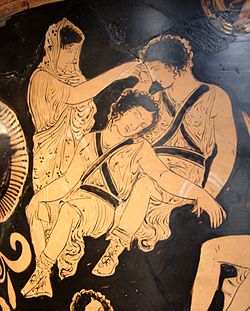


Clytemnestra
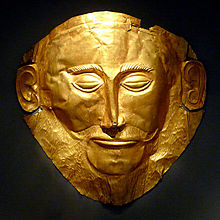


Agamemnon
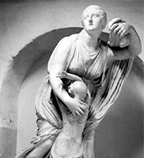


Niobe
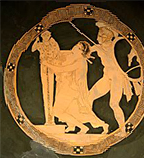


Cassandra
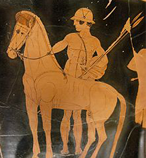


Castor
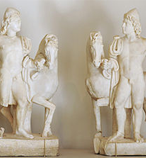


Polydeuces
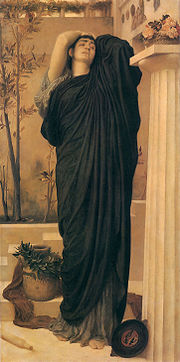


Electra






parent–child


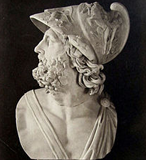


Menelaus
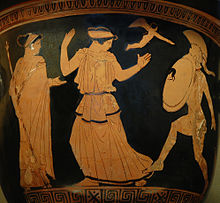


Helen
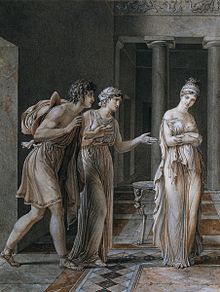


Hermione
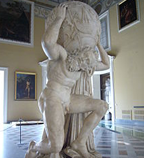


Atlas
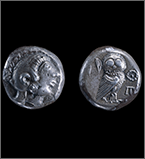


Pluto
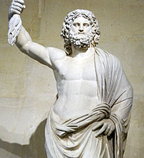


Zeus

Διωνη


Dione
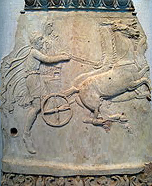


Hippodameia
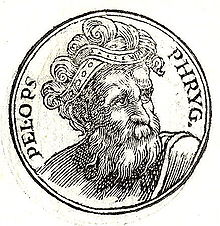


Pelops
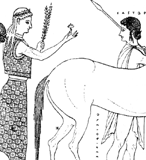


Tyndareus
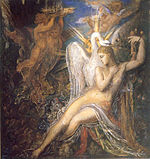


Leda
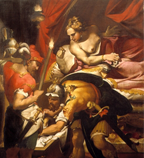


Aerope
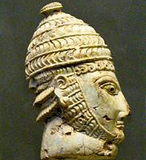


Atreus
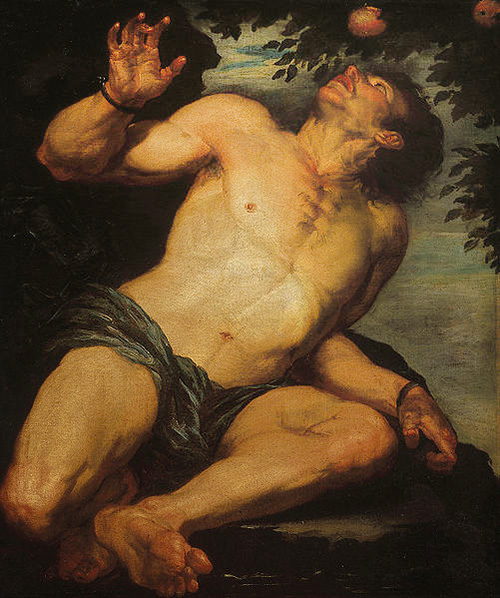


Tantalus

Show All Names

Hide All Names
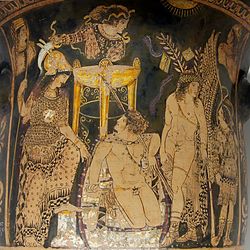


Orestes
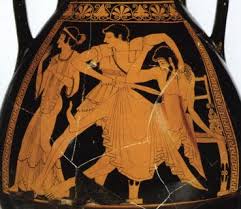


Chrysothemis
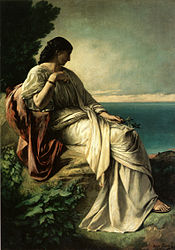


Iphigenia







son
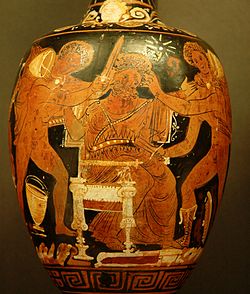


Aegisthus




parent–child





sexual relationship
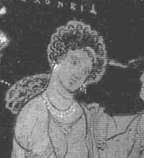


Pelopia
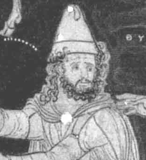


Thyestes

Show All Relationships

Hide All Relationships

Zoom In